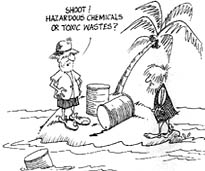Second move
 officials from 87 countries met in Nairobi last week under the aegis of the United Nations ( un) , to deliberate on framing a global convention on the trade of hazardous chemicals and pesticides. The meeting which took place between September 16-20 at the un environment programme ( unep ) headquarters in Gigiri, was the second of three sessions, planned as part of an inter-governmental process to reach a legally binding treaty regulating the import and export of hazardous chemicals and pesticides through the prior informed consent ( pic ) procedure. The final and third round of the session will most probably be held in the Netherlands early next year, and is expected to have the convention in place.
officials from 87 countries met in Nairobi last week under the aegis of the United Nations ( un) , to deliberate on framing a global convention on the trade of hazardous chemicals and pesticides. The meeting which took place between September 16-20 at the un environment programme ( unep ) headquarters in Gigiri, was the second of three sessions, planned as part of an inter-governmental process to reach a legally binding treaty regulating the import and export of hazardous chemicals and pesticides through the prior informed consent ( pic ) procedure. The final and third round of the session will most probably be held in the Netherlands early next year, and is expected to have the convention in place.
"We have made excellent progress,' said James Willis, director of chemicals, unep . "The negotiations moved at a very rapid pace and covered many of the major issues. If the governments retain the commitment demonstrated to date, then I am sure they will meet their target of a legally binding treaty in 1997. With a pic convention in operation, the international community will have taken its first major step towards establishing a comprehensive approach to chemical risks.' The Nairobi talks have taken into consideration the threat posed by genetically-engineered pesticides and the problem faced by the chemical contamination in food residues.
The voluntary pic procedure allows importing countries to know more about the characteristics of hazardous chemicals and pesticides that may be shipped to them. This allows them to decide whether they want to permit or ban future imports. Accordingly, exporting countries are notified as to which products importing countries no longer want to receive and can help ensure that illegal exports do not occur. The procedure is jointly handled by unep and the un Food and Agriculture Organization ( fao ).
A number of companies are worried about the pic procedure. They are unsure as to how much data they should reveal especially when exporting to developing countries. Until now, illegal trade has dominated most of their sales and the new restrictions, which will be made compatible with the World Trade Organization norms , could dampen their profit margin.
"Chemicals are now at the top of the global environmental agenda,' said Elizabeth Dowdeswell, executive director, unep . Efforts by unep and fao to promote chemical safety were initially based on the 1985 international code of conduct on the distribution and use of pesticides and the 1987 London guidelines for the exchange of information on chemicals in international trade. These two voluntary systems encourage governments to share information amongst themselves and to shift to ecologically sustainable chemicals management. As some pesticides and other chemicals that are banned or severely restricted in certain developed countries are still widely used elsewhere, particularly in developing countries, the governing bodies of unep and fao introduced the voluntary pic in 1989. As of July 1996, some 145 countries are participating in the pic procedure. Through the pic procedure, 12 pesticides and five industrial chemicals have currently been identified as hazardous.
Related Content
- Order of the Supreme Court regarding removal of the encroachments from the river bed/flood plain zone of river Rispana, Uttarakhand, 10/02/2025
- Global waste management outlook 2024
- National multidimensional poverty index: a progress review 2023
- Energy transition pathways for the 2030 agenda: sustainable energy transition road map for Chiang Rai Province, Thailand
- G5 Sahel region country climate and development report
- No time to lose, says Sunita Narain on the new IPCC report
